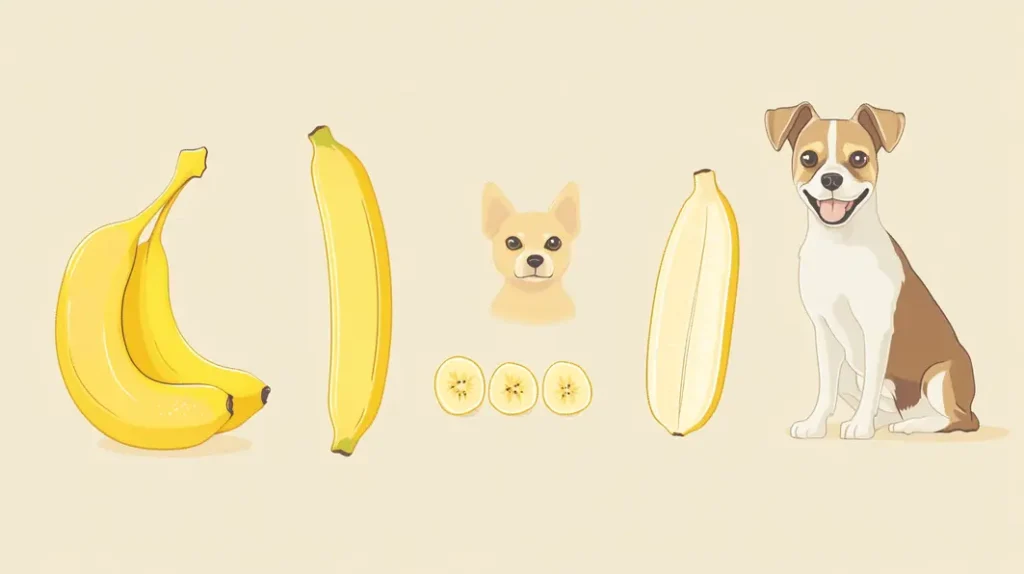As dog owners, we often find ourselves wondering about the safety of sharing our favorite snacks with our furry companions. One such snack that frequently comes to mind is the banana. Known for their natural sweetness and creamy texture, bananas are a popular fruit among humans. But can dogs safely indulge in this delightful treat? The answer is yes, dogs can eat bananas, and there are several nutritional benefits to this fruit.
Bananas are packed with essential vitamins and minerals that can contribute to a dog’s overall health. They are rich in potassium, which supports healthy muscle function and aids in maintaining a proper fluid balance. Additionally, bananas provide vitamin C, an antioxidant that helps strengthen the immune system and promotes healthy skin. They also contain dietary fiber, which can aid in digestion and help prevent gastrointestinal issues. This makes bananas a nutritious addition to your dog’s diet when offered in moderation.
However, while bananas can be a healthy treat, there are some potential risks to consider. The high sugar content in bananas can be a concern, especially for dogs that are overweight or have diabetes. Excessive consumption may lead to gastrointestinal upset, including diarrhea and vomiting. It’s crucial to introduce bananas slowly into your dog’s diet and observe how they react. Moreover, always remove the peel before feeding bananas to your dog, as the tough skin can be difficult for them to digest and may cause blockages.
In summary, bananas can be a safe and nutritious treat for dogs when given in moderation. Understanding the balance between their benefits and potential risks allows dog owners to make informed decisions about including this fruit in their pet’s diet. Always consult with your veterinarian before introducing any new food to ensure it’s suitable for your dog’s unique health needs.

Understanding Dogs and Bananas: Can dog eat bananas?
Definition of Dogs and Bananas
When we say that dogs can eat bananas, it refers to the practice of offering this fruit as a treat or supplement to their regular diet. Bananas are a soft, edible fruit that belongs to the genus Musa and are rich in various nutrients, including potassium, vitamin C, and dietary fiber.
In the context of canine nutrition, bananas can be considered a “human food,” which is any food typically consumed by people that can also be safely shared with pets. The term “moderation” is crucial here; while bananas can provide health benefits, excessive consumption may lead to gastrointestinal issues due to their high sugar content.
Veterinarians often recommend incorporating fruits like bananas as part of a balanced diet, but it’s essential to understand portion control to avoid overfeeding. The “peel” of the banana should be discarded, as it can be hard for dogs to digest. Overall, feeding dogs bananas can be a healthy way to provide variety in their diet, enhance their treat experience, and deliver beneficial nutrients, provided it is done thoughtfully and in accordance with their individual health needs.
Importance of Dogs Eating Healthy Treats
Healthy treats play a crucial role in a dog’s diet, offering not only a source of enjoyment but also nutritional benefits that contribute to their overall well-being. Treats can reinforce positive behaviors during training, provide mental stimulation, and create a bond between the dog and owner. However, not all treats are created equal. Choosing nutritious options ensures that these snacks enhance rather than detract from a dog’s health.
Incorporating healthy treats into a dog’s diet can help maintain a balanced nutrition plan. Dogs thrive on a diet that is rich in essential vitamins, minerals, and nutrients, much like humans. When selecting treats, pet owners should prioritize options that are low in calories and free from artificial additives, sugars, and fillers. Natural treats, like fruits and vegetables, can be an excellent choice for this purpose.
Bananas fit perfectly into the category of healthy treats for dogs. They are rich in potassium, which supports muscle function and cardiovascular health, and they provide vitamin C for immune support. The fiber in bananas aids digestion and can help regulate bowel movements. Additionally, bananas are low in calories compared to many commercial dog treats, making them a guilt-free option for pet owners.
When offering bananas, it’s essential to do so in moderation to avoid any potential gastrointestinal upset, particularly due to their natural sugar content. By introducing bananas as an occasional treat, dog owners can enhance their pets’ diets, providing both taste and health benefits. Overall, healthy treats like bananas can be a delightful and nutritious addition to a dog’s routine, supporting their physical and emotional well-being.
Key Concepts and Terms
Understanding dog nutrition involves several key concepts and terms that are essential for making informed dietary choices for our canine companions.
1.Balanced Diet: A balanced diet for dogs includes the right proportions of proteins, fats, carbohydrates, vitamins, and minerals. Each nutrient plays a crucial role in maintaining health, supporting growth, and providing energy.
2.Macronutrients: These are the nutrients that provide energy and are needed in large amounts. They include:
•Proteins: Essential for muscle development and repair.
•Fats: Provide energy and support cell function.
•Carbohydrates: Offer energy and aid in digestion.
3.Micronutrients: These are vitamins and minerals required in smaller quantities but are vital for various bodily functions. For example, potassium and vitamin C found in bananas contribute to muscle function and immune health, respectively.
4.Human Foods: This term refers to foods typically consumed by humans that may also be safe for dogs. Not all human foods are suitable; it’s crucial to identify which are beneficial, like fruits, and which are harmful, like chocolate or grapes.
5.Moderation: This concept emphasizes the importance of portion control. While fruits like bananas can be healthy treats, they should be given in moderation to prevent issues like obesity or digestive upset due to their sugar content.
6.Treats: Treats are supplementary foods given to dogs, often used for training or rewarding good behavior. Choosing healthy options like fruits can enhance a dog’s overall nutrition while adding variety to their diet.
Relevant Statistics and Facts
Bananas are increasingly recognized as a healthy snack option for dogs, and several interesting statistics and facts highlight their benefits. According to the American Kennel Club (AKC), bananas are safe for dogs to eat in moderation, and many dog owners are embracing this fruit as a nutritious treat.
1.Nutritional Profile: A medium banana contains approximately 105 calories, making it a relatively low-calorie snack compared to many commercial dog treats, which can often exceed 200 calories per serving.
2.Potassium Content: Bananas are an excellent source of potassium, with about 422 mg per medium-sized fruit. This is significant considering that potassium is vital for muscle and nerve function, crucial for active dogs.
3.Sugar Content: While bananas are healthy, they do contain natural sugars, with about 14 grams per medium banana. This sugar content means moderation is key, especially for overweight dogs or those with diabetes.
4.Fiber Benefits: A medium banana provides around 3 grams of dietary fiber, which can help promote healthy digestion. Regular intake of fiber-rich foods can assist in preventing gastrointestinal issues in dogs.
5.Popularity: Surveys show that over 60% of dog owners are willing to share fruits with their pets, with bananas often being a top choice due to their sweetness and palatability.
Overall, these statistics illustrate that bananas can be a healthy and enjoyable addition to a dog’s diet when offered appropriately.

Benefits of Dogs Eating Bananas
Overview of Benefits
Feeding bananas to dogs can offer numerous health benefits, making them a popular choice among pet owners. One of the primary advantages is their rich nutritional profile. Bananas are an excellent source of potassium, which supports healthy muscle and nerve function, essential for active dogs. Additionally, they contain vitamin C, an antioxidant that aids in boosting the immune system and promoting skin health.
Bananas are also high in dietary fiber, with a medium-sized fruit providing about 3 grams. This fiber content can help regulate digestion and prevent gastrointestinal issues, such as constipation. Moreover, bananas are low in calories compared to many commercial dog treats, making them a guilt-free option for rewarding pets without contributing to weight gain.
Another benefit is the natural sweetness of bananas, which can be enticing for dogs, encouraging them to enjoy healthier snacks instead of processed treats. Introducing bananas can also add variety to a dog’s diet, enhancing their overall eating experience.
Lastly, bananas are easy to prepare and serve—simply peel and slice for a quick treat. Overall, when offered in moderation, bananas can be a delicious and nutritious addition to a dog’s diet, supporting their health and well-being.
Detailed Benefit 1
One of the foremost benefits of feeding bananas to dogs is their impressive nutritional profile, which can significantly contribute to a dog’s overall health and well-being. Bananas are rich in essential vitamins and minerals that play a vital role in maintaining various bodily functions.
Potassium is one of the most notable nutrients found in bananas, with a medium-sized banana containing approximately 422 mg. This mineral is crucial for several reasons. It helps regulate fluid balance in the body, supports healthy muscle contractions, and is essential for maintaining proper nerve function. For active dogs, adequate potassium intake can enhance performance and prevent muscle cramps during exercise.
In addition to potassium, bananas provide vitamin C, an antioxidant that helps boost the immune system. This vitamin plays a significant role in fighting off infections and promoting overall health. While dogs can produce their own vitamin C, additional sources from fruits like bananas can be beneficial, particularly for older dogs or those with weakened immune systems.
Dietary fiber is another important component of bananas, with a medium banana offering about 3 grams of fiber. Fiber aids in digestion, promoting regular bowel movements and preventing gastrointestinal issues such as constipation. A diet rich in fiber can also help maintain a healthy weight, as it provides a feeling of fullness without excessive calories.
Finally, bananas are low in fat and cholesterol-free, making them a heart-healthy treat. Their natural sweetness can satisfy a dog’s cravings for something delicious, providing a wholesome alternative to many commercial treats that often contain artificial ingredients and high sugar levels. In summary, the nutritional benefits of bananas can significantly enhance a dog’s diet and support their overall health.
Detailed Benefit 2
Another significant benefit of feeding bananas to dogs lies in their positive impact on digestive health. Bananas are rich in dietary fiber, which is essential for maintaining a healthy gastrointestinal tract. A medium-sized banana contains about 3 grams of fiber, which can play a vital role in regulating digestion.
Promoting Regularity: The soluble fiber found in bananas helps absorb water in the digestive system, forming a gel-like substance that aids in the smooth movement of food through the intestines. This process can help prevent constipation, ensuring that your dog has regular, healthy bowel movements. For dogs that are prone to digestive issues, such as those experiencing intermittent constipation or diarrhea, incorporating bananas into their diet can provide a gentle and natural way to promote regularity.
Feeding a Balanced Diet: Dogs that consume a well-rounded diet that includes fiber-rich foods like bananas are more likely to maintain healthy gut flora. A balanced gut microbiome is crucial for proper digestion, nutrient absorption, and overall health. The fiber in bananas acts as a prebiotic, providing nourishment for beneficial gut bacteria, which can lead to improved digestion and nutrient absorption.
Calming an Upset Stomach: Bananas can also be beneficial for dogs experiencing mild gastrointestinal upset. Their soft texture and mild flavor make them easy to digest, providing a soothing effect on the stomach. Many veterinarians recommend bananas as a natural remedy for dogs recovering from digestive disturbances, as they can help restore balance to the digestive system.
Overall, the digestive health benefits of feeding bananas to dogs not only enhance their quality of life but also support long-term well-being, making them a valuable addition to a dog’s diet.
Detailed Benefit 3
Feeding bananas to dogs offers notable heart health benefits, primarily due to their rich potassium content and low-fat profile. Potassium is an essential mineral that plays a critical role in maintaining cardiovascular health, making bananas a heart-friendly snack for our canine companions.
Regulating Blood Pressure: One of the most significant benefits of potassium is its ability to help regulate blood pressure. A balanced potassium intake can counteract the effects of sodium in the diet, helping to maintain optimal blood pressure levels. High blood pressure can lead to serious health issues in dogs, including heart disease and other cardiovascular complications. By incorporating bananas into a dog’s diet, pet owners can contribute to a more balanced mineral intake, promoting overall heart health.
Supporting Heart Function: Potassium is vital for proper heart function, as it assists in maintaining a steady heartbeat and supports efficient electrical signaling within the heart. This is particularly important for older dogs or those predisposed to heart conditions. Adequate potassium levels can help ensure that the heart muscles function effectively, reducing the risk of arrhythmias and other cardiac issues.
Low in Fat: Bananas are naturally low in fat, making them an excellent treat option for dogs that need to maintain a healthy weight. Excess body weight can put additional strain on a dog’s heart, leading to increased risks of cardiovascular disease. By providing low-calorie, low-fat treats like bananas, pet owners can help their dogs enjoy a satisfying snack while promoting heart health.
Antioxidant Properties: Additionally, bananas contain antioxidants such as vitamin C, which can combat oxidative stress and inflammation in the body. Chronic inflammation can contribute to heart disease, making it essential to incorporate antioxidant-rich foods into a dog’s diet. Overall, the heart health benefits of bananas make them a valuable addition to any dog’s nutrition plan.
Summary of Benefits
Feeding bananas to dogs offers a variety of health benefits that can enhance their overall well-being. First and foremost, bananas are rich in potassium, an essential mineral that supports muscle function and helps regulate blood pressure. This makes them particularly beneficial for heart health, as adequate potassium intake can reduce the risk of cardiovascular issues.
Additionally, bananas provide dietary fiber, which promotes healthy digestion and regular bowel movements. The fiber content can help prevent constipation and improve gut health, supporting a balanced digestive system. Bananas are also low in fat and calories, making them a guilt-free treat option that can satisfy a dog’s sweet tooth without contributing to weight gain.
Furthermore, the antioxidants found in bananas, such as vitamin C, help bolster the immune system and combat oxidative stress, which is crucial for aging dogs or those with health issues. Their mild flavor and soft texture make bananas easy for dogs to digest, making them a soothing option for pets experiencing mild gastrointestinal upset.
Overall, incorporating bananas into a dog’s diet can provide a nutritious, delicious, and heart-healthy treat, contributing to their long-term health and happiness.
Common Myths About Dogs Eating Bananas

Prevalence of Myths
Despite the growing awareness of the benefits of bananas for dogs, several myths persist regarding their safety and suitability as a treat. One common myth is that bananas are toxic to dogs. This is false; bananas are generally safe for dogs to eat in moderation. While certain fruits, like grapes and raisins, can be harmful, bananas do not pose the same risk.
Another prevalent myth suggests that feeding bananas can lead to weight gain or obesity in dogs. While it’s true that bananas contain natural sugars, they are low in calories compared to many commercial dog treats. When offered as an occasional treat and balanced with a dog’s overall diet, bananas can be a healthy addition rather than a weight concern.
Some dog owners believe that the peel is safe for dogs to consume. However, banana peels can be difficult for dogs to digest and may cause gastrointestinal blockages. It’s essential to remove the peel before offering bananas to your pet.
Finally, there’s a misconception that only certain breeds can safely enjoy bananas. In reality, most dogs, regardless of breed, can benefit from this fruit when introduced appropriately and in moderation. Addressing these myths is crucial for ensuring that dog owners make informed choices about their pets’ diets.
Myth 1 and Debunking
One of the most widespread myths about feeding bananas to dogs is that they are toxic. This misconception often arises from a general concern among pet owners regarding which human foods are safe for dogs. However, extensive research and veterinary insights debunk this myth, confirming that bananas are safe and can be a nutritious treat for dogs when given in moderation.
Evidence from veterinary professionals indicates that bananas do not contain any toxic compounds harmful to dogs. The American Kennel Club (AKC) explicitly states that bananas are non-toxic and can be a healthy snack for dogs. They are rich in essential vitamins and minerals, such as potassium, vitamin C, and dietary fiber, which can contribute positively to a dog’s diet.
Moreover, the toxicity myth may stem from confusion about other fruits that are genuinely harmful to dogs, such as grapes and raisins, which can lead to kidney failure. This has created an unnecessary fear around feeding a variety of fruits, including bananas. It is important to clarify that each fruit has a unique nutritional profile and potential risks.
The key is moderation. While bananas are safe, they should not replace a dog’s regular diet. Too much of any treat, including bananas, can lead to digestive issues or unwanted weight gain due to their natural sugar content. By offering bananas in small amounts and monitoring your dog’s reaction, you can safely include this delicious fruit in their diet without any concern for toxicity.
In conclusion, bananas are a safe and beneficial treat for dogs, debunking the myth of their toxicity and highlighting the importance of informed dietary choices.
Myth 2 and Debunking
Another prevalent myth regarding dogs and bananas is that feeding them this fruit will inevitably lead to weight gain. While it’s essential to be mindful of a dog’s overall calorie intake, the idea that bananas are inherently fattening is misleading and requires clarification.
Bananas are relatively low in calories compared to many commercial dog treats. A medium banana contains about 105 calories, while many store-bought dog treats can contain 200 calories or more per serving. This means that when offered in moderation, bananas can be a healthier alternative to processed snacks high in sugars and fats. According to the American Kennel Club (AKC), fruits like bananas can provide a low-calorie option that satisfies a dog’s sweet tooth without contributing significantly to their daily caloric intake.
Moreover, bananas are high in dietary fiber, which can actually aid in digestion and promote a feeling of fullness. This can help prevent overeating and support weight management when integrated appropriately into a dog’s diet. The key is moderation—while bananas can be a healthy treat, they should not replace a balanced diet or be given in excessive amounts.
Additionally, a dog’s overall weight is influenced by multiple factors, including breed, age, activity level, and the total amount of food consumed. Relying solely on bananas or any single food as a primary treat could lead to an unbalanced diet.
In summary, the myth that feeding bananas to dogs will lead to weight gain is unfounded. When offered as an occasional treat within a balanced diet, bananas can be a safe and nutritious option that enhances a dog’s enjoyment without posing significant risks to their weight or health.
Myth 3 and Debunking
A common myth surrounding dogs and bananas is that the banana peel is safe for dogs to consume. Many pet owners may assume that since the fruit is healthy, the peel must also be beneficial. However, this belief is misguided and can pose risks to your dog’s health.
Banana peels are tough and fibrous, making them difficult for dogs to digest. Ingesting the peel can lead to gastrointestinal blockages or irritation, potentially causing symptoms like vomiting, diarrhea, or abdominal pain. According to veterinarians, while the peel contains some nutrients, the risks associated with feeding it to dogs far outweigh the benefits. The American Kennel Club (AKC) emphasizes that the peel can be challenging for dogs to process, and it’s advisable to stick to the flesh of the banana.
Additionally, feeding banana peels can lead to an increase in fiber intake that might overwhelm a dog’s digestive system, especially if they are not used to high-fiber foods. This sudden change can result in digestive upset, including gas, bloating, and diarrhea.
It’s crucial for dog owners to understand that while bananas themselves can be a nutritious treat, the peel should always be discarded. To ensure the safety and well-being of your pet, it’s best to feed only the soft, edible part of the banana and to do so in moderation.
Importance of Understanding Myths
Understanding myths related to dogs and banana consumption is crucial for ensuring the health and well-being of our furry companions. Misinformation can lead to harmful dietary choices that negatively impact a dog’s health. For example, believing that bananas are toxic may prevent pet owners from offering a nutritious treat that is safe in moderation. This misunderstanding can limit the variety of healthy foods dogs can enjoy.
Moreover, recognizing the truth behind common myths can foster better nutrition and positive feeding practices. Knowledge about the actual benefits of bananas, such as their potassium content and digestive health advantages, empowers dog owners to make informed decisions about their pets’ diets.
Dispelling myths also promotes responsible pet ownership. Educating ourselves and others helps to create a culture of awareness regarding dog nutrition. This is especially important in an age where misinformation can spread quickly through social media and online forums.
By addressing and debunking these myths, dog owners can provide balanced diets that contribute to their pets’ overall health, happiness, and longevity. Ultimately, understanding the facts surrounding banana consumption can lead to healthier and more enjoyable feeding experiences for both dogs and their owners.
Practical Tips for Feeding Dogs Bananas

Introduction to Practical Tips
Feeding bananas to dogs can be a delightful and nutritious addition to their diet, but it’s essential to approach this practice with care and consideration. While bananas are generally safe and provide numerous health benefits—such as potassium, dietary fiber, and essential vitamins—they should be given in moderation and prepared correctly to ensure your furry friend enjoys them safely.
As pet owners, understanding how to introduce bananas into your dog’s diet can enhance their eating experience while also promoting their health. This introduction lays the groundwork for practical tips that can help you incorporate bananas effectively into your dog’s treat rotation.
Firstly, it’s important to know the right portion sizes based on your dog’s size, age, and activity level. Learning how to prepare bananas properly, such as peeling them and serving them in appropriate portions, is crucial for preventing any digestive issues.
Additionally, recognizing the signs of allergies or sensitivities is vital when introducing any new food, including bananas. Monitoring your dog’s reaction after offering bananas for the first time can help ensure they enjoy this fruit without any adverse effects.
With these foundational tips in mind, you can confidently explore the benefits of bananas as a healthy treat, creating a rewarding and enjoyable experience for your beloved canine companion.
Tip 1: Proper Preparation
Preparing bananas for dogs is a straightforward process, but doing it correctly ensures that your furry friend enjoys this nutritious treat safely. Here’s a step-by-step guide to help you serve bananas in a way that maximizes their health benefits while minimizing any potential risks.
1. Choosing the Right Banana: Start by selecting a ripe banana. Look for bananas that are yellow with a few brown spots, as they are sweeter and easier for dogs to digest. Avoid overly ripe bananas that are blackened or mushy, as these can ferment and cause digestive upset.
2. Washing: While the banana peel is not meant for your dog, it’s good practice to wash the banana before peeling. This helps remove any pesticides or contaminants that may be present on the surface, ensuring a cleaner treat.
3. Peeling: Always peel the banana before offering it to your dog. The peel is tough and difficult for dogs to digest, potentially leading to gastrointestinal blockages or discomfort. Discard the peel to keep your dog safe.
4. Serving Size: Cut the banana into appropriate serving sizes based on your dog’s size. Small dogs may only need a few small slices, while larger breeds can enjoy a larger portion. As a general rule, treats should make up no more than 10% of a dog’s daily caloric intake.
5. Monitoring: After introducing bananas, monitor your dog for any signs of allergies or digestive issues. If your dog experiences vomiting or diarrhea, it’s best to discontinue feeding bananas and consult a veterinarian.
Tip 2: Portion Control
1. Consider Your Dog’s Size: The first step in managing portion sizes is to take your dog’s size into account. Small dogs, such as Chihuahuas or Pomeranians, require smaller portions compared to larger breeds like Golden Retrievers or German Shepherds. A general guideline is to offer small dogs 1-2 slices of banana, while medium to large dogs can enjoy 2-4 slices.
2. Daily Treat Limit: Treats should comprise no more than 10% of your dog’s daily caloric intake. For instance, if your dog requires 500 calories daily, treats should total around 50 calories. Since a medium banana contains approximately 105 calories, this means you should limit banana consumption to just a few slices, factoring in other treats they may receive throughout the day.
3. Monitor Weight and Health: Regularly assess your dog’s weight and overall health. If you notice weight gain or any digestive issues, consider adjusting the portion sizes or frequency of banana treats.
4. Variety is Key: To prevent over-reliance on any single treat, rotate bananas with other dog-friendly fruits and snacks. This not only keeps your dog’s diet balanced but also prevents boredom.
Tip 3: Signs of Allergies
1. Gastrointestinal Upset: One of the most frequent reactions dogs may experience is gastrointestinal discomfort. Symptoms can include vomiting, diarrhea, or gas. If your dog shows signs of distress shortly after eating bananas, it may indicate an intolerance or sensitivity to the fruit.
2. Skin Reactions: Allergic reactions can manifest through skin issues. Watch for signs such as itching, redness, hives, or rashes. If you notice your dog scratching more than usual or developing unusual bumps on their skin after consuming bananas, it may signal an allergy.
3. Swelling: In more severe cases, dogs may experience swelling in areas such as the face, ears, or paws. This swelling can indicate an acute allergic reaction and may require immediate veterinary attention.
4. Lethargy: If your dog appears unusually tired or lethargic after eating bananas, it could be a sign of an adverse reaction. Pay attention to any changes in their energy levels or behavior.
5. Respiratory Issues: In rare cases, dogs may experience respiratory problems, such as difficulty breathing, coughing, or wheezing. These symptoms can indicate a serious allergic reaction and require urgent veterinary care.
Additional Tips/Considerations
1. Introduce Gradually: If it’s your dog’s first time eating bananas, introduce the fruit slowly. Start with a small piece and observe how your dog reacts. This helps to identify any sensitivities or allergies.
2. Moderation is Key: Remember that bananas, while healthy, should only be offered in moderation. Treats should make up no more than 10% of your dog’s daily caloric intake to prevent potential weight gain and digestive issues.
3. Experiment with Preparation: Dogs may enjoy bananas in various forms. Try mashing the banana, slicing it, or freezing it for a cool treat on hot days. You can also mix mashed bananas into their regular food or use them as an ingredient in homemade dog treats.
4. Avoid Combinations: Do not mix bananas with other ingredients that may be harmful to dogs, such as chocolate, nuts, or sweeteners like xylitol.
5. Consult Your Vet: If you have any concerns about your dog’s diet or health, consult your veterinarian. They can provide personalized recommendations based on your dog’s specific needs.
Case Studies/Real-Life Examples

Introduction to Case Studies
Case studies play a crucial role in enhancing our understanding of dogs and their dietary habits, particularly when it comes to feeding them human foods like bananas. Through detailed observations and analyses of individual dogs’ reactions to bananas, these studies provide valuable insights into the nutritional benefits, potential risks, and overall safety of including this fruit in a canine diet.
By examining specific instances where dogs have consumed bananas, researchers and veterinarians can gather data on common reactions, such as allergies or digestive issues, which may vary among different breeds and sizes. Case studies help highlight the importance of moderation, revealing how portion sizes affect a dog’s health and well-being.
Furthermore, they allow pet owners to learn from real-life experiences, emphasizing best practices for safely introducing new foods into a dog’s diet. This knowledge empowers pet owners to make informed decisions about their dogs’ nutrition, ensuring that they can enjoy healthy treats without compromising their health.
Ultimately, case studies are invaluable tools that deepen our understanding of the implications of feeding bananas to dogs, leading to safer and more enjoyable feeding practices for both pets and their owners.
Case Study 1: A Dog’s Positive Experience
Background: Bella, a 4-year-old Beagle, weighed 30 pounds and was known for her playful and energetic personality. Her owner, Sarah, was always on the lookout for healthy treats to supplement Bella’s diet, which primarily consisted of high-quality kibble. Sarah had heard about the benefits of bananas for dogs and decided to introduce this fruit into Bella’s diet.
Introduction of Bananas: After researching and consulting her veterinarian, Sarah began by offering Bella a small piece of ripe banana. She started with a half-inch slice, monitoring Bella’s reaction closely. Bella eagerly accepted the banana and quickly devoured the piece without any signs of discomfort.
Observations: Encouraged by Bella’s positive reaction, Sarah continued to offer her small slices of banana a few times a week. Within a month, Sarah noticed several benefits. Bella’s energy levels remained high, and her coat appeared shinier and healthier. Additionally, Bella’s digestion improved; she had regular bowel movements, and there were no signs of gastrointestinal upset, which sometimes occurred with other treats.
Behavioral Changes: Beyond physical health, Sarah observed an enhancement in Bella’s mood during treat time. The sweet taste of banana seemed to excite Bella, making her even more eager to participate in training sessions. The treat served as a motivating factor, encouraging Bella to learn new tricks and commands.
Case Study 2: A Dog’s Adverse Reaction
Background: Max, a 6-year-old Labrador Retriever, was a 70-pound dog known for his friendly demeanor and love of food. His owner, Tom, regularly treated Max to various fruits and vegetables as part of a balanced diet. After hearing about the nutritional benefits of bananas, Tom decided to incorporate them into Max’s snack routine.
Introduction of Bananas: Tom introduced bananas gradually, starting with a small slice on a weekend afternoon. Max seemed excited about the new treat and eagerly consumed the banana without hesitation. After the initial introduction, Tom continued to give Max a few slices of banana a couple of times a week.
Adverse Reaction: However, within 24 hours of the first banana introduction, Tom noticed a significant change in Max’s behavior. The usually energetic Labrador became lethargic and disinterested in his favorite activities, such as fetching and playing with his toys. Additionally, Max developed a mild case of diarrhea, which Tom initially attributed to a change in diet.
Veterinary Consultation: Concerned about Max’s symptoms, Tom took him to the veterinarian. After discussing Max’s recent diet changes, the vet suspected a sensitivity to bananas and recommended stopping all banana treats immediately. Tom followed the vet’s advice, and within a few days, Max’s energy levels returned to normal, and his digestive issues resolved.
Implications of Case Studies
The case studies of dogs, both positive and negative, provide critical insights into the implications of feeding bananas to canine companions. These real-life experiences underscore the importance of understanding individual differences in dogs’ dietary tolerances. For example, while some dogs, like Bella, may thrive on bananas as a nutritious treat, others, like Max, may experience adverse reactions.
These findings highlight the necessity of introducing new foods gradually and monitoring for any signs of allergies or digestive issues. They serve as a reminder that each dog is unique, with varying dietary needs and sensitivities. As such, pet owners should approach banana consumption with caution, ensuring they tailor treats to their dogs’ specific health profiles.
Moreover, these case studies emphasize the value of consulting with veterinarians before making significant dietary changes. Professional guidance can help prevent potential health issues and ensure that treats like bananas enhance a dog’s diet rather than complicate it.
Ultimately, these case studies advocate for informed decision-making in dog nutrition. By learning from the experiences of others, pet owners can create a safe and enjoyable dietary environment that promotes the health and happiness of their furry friends.
FAQs About Dogs Eating Bananas

Importance of FAQs
Frequently Asked Questions (FAQs) play a vital role in educating dog owners about the dietary considerations and implications of feeding bananas to their pets. These resources provide concise, accessible information that addresses common concerns, helping owners make informed decisions regarding their dogs’ nutrition.
FAQs can clarify misconceptions, such as the safety of banana peels or the appropriate portion sizes for different dog breeds. By offering evidence-based answers, these resources empower pet owners to incorporate bananas into their dogs’ diets safely while minimizing risks associated with allergies or digestive issues.
Moreover, FAQs can help streamline the process of finding reliable information, saving time for busy pet owners who may not have access to veterinary advice at all times. They often cover a range of topics, from the nutritional benefits of bananas to potential adverse reactions, ensuring that owners have a well-rounded understanding of the subject.
In addition, FAQs foster a community of informed pet owners, encouraging discussions about best practices for dog nutrition. This shared knowledge can lead to healthier dietary choices, ultimately enhancing the well-being and longevity of dogs. By addressing the most pressing questions, FAQs serve as an essential tool for promoting safe and enjoyable feeding practices.
Question 1: Can puppies eat bananas?
Yes, puppies can eat bananas in moderation! This fruit is a safe and nutritious treat that can provide health benefits for young dogs. Bananas are rich in essential vitamins, minerals, and dietary fiber, which can support a puppy’s growth and development. However, it’s important to introduce bananas gradually to ensure your puppy doesn’t have any adverse reactions or sensitivities.
Start with small pieces to gauge their tolerance and monitor for any signs of digestive upset, such as diarrhea or vomiting. Keep in mind that treats, including bananas, should only make up about 10% of a puppy’s daily caloric intake to maintain a balanced diet. Always consult your veterinarian if you have concerns about introducing new foods. With proper portioning and monitoring, bananas can be a delightful and healthy addition to your puppy’s diet!
Question 2: How many bananas can a dog eat?
The number of bananas a dog can safely eat varies based on their size, weight, and overall health. Generally, bananas should be treated as an occasional treat rather than a staple food. For small dogs, one or two small slices per day is usually sufficient. Medium to large dogs can typically enjoy 2-4 slices, but it’s essential to keep the portion sizes appropriate to avoid digestive issues.
As a guideline, treats, including bananas, should not exceed 10% of your dog’s daily caloric intake. For instance, if your dog requires 500 calories daily, treats should total around 50 calories. Since a medium banana contains approximately 105 calories, it’s best to limit banana consumption and balance it with other treats and their regular diet. Always observe your dog for any adverse reactions when introducing new foods, and consult your veterinarian if you have concerns about portion sizes.
Question 3: Are there any dogs that should avoid bananas?
Yes, certain dogs may need to avoid bananas. Dogs with specific health issues, such as diabetes or pancreatitis, should be cautious about consuming bananas due to their natural sugar content. Excess sugar can lead to spikes in blood sugar levels, which can be detrimental for diabetic dogs.
Additionally, dogs that are overweight or prone to obesity should limit their intake of high-calorie treats, including bananas, to prevent further weight gain.
Some dogs may also have allergies or sensitivities to bananas, which could result in gastrointestinal upset, skin irritations, or other allergic reactions. If your dog has a history of food allergies, it’s essential to introduce bananas gradually and monitor for any adverse reactions.
Always consult your veterinarian before adding new foods to your dog’s diet, especially if they have underlying health conditions or special dietary needs.
Conclusion
Summary of Main Points
This article explores the various aspects of feeding bananas to dogs, highlighting their nutritional benefits, potential risks, and guidelines for safe consumption. Bananas are rich in essential vitamins, minerals, and dietary fiber, making them a healthy treat when offered in moderation. They can support a dog’s overall health, including improved digestion and enhanced energy levels. However, moderation is crucial; treats, including bananas, should not exceed 10% of a dog’s daily caloric intake to prevent weight gain and digestive issues.
The article also discusses the importance of recognizing allergies and adverse reactions in dogs after eating bananas. Symptoms such as gastrointestinal upset, skin irritations, lethargy, or swelling may indicate sensitivity or intolerance. Case studies illustrate both positive experiences and adverse reactions, emphasizing that individual dogs may respond differently to bananas.
Moreover, the significance of FAQs in educating dog owners about safe feeding practices is highlighted, providing a quick reference for common questions regarding bananas in a dog’s diet. Owners are reminded to introduce bananas gradually, monitor their dogs for any negative reactions, and consult veterinarians when necessary.
Finally, specific considerations are addressed, including how many bananas a dog can eat and which dogs should avoid bananas altogether, particularly those with diabetes, pancreatitis, or food allergies. The article serves as a comprehensive guide, empowering pet owners to make informed decisions about incorporating bananas into their dogs’ diets, ensuring a safe and enjoyable experience for their furry friends.
Future Outlook on Dogs and Bananas
The future outlook for feeding bananas to dogs appears promising, with ongoing research highlighting their potential health benefits and safety when incorporated appropriately into canine diets. As pet owners increasingly seek natural, nutritious treat options, bananas are gaining popularity due to their rich nutrient profile, which includes potassium, vitamin C, and dietary fiber.
Emerging studies are likely to focus on the specific health impacts of bananas on various dog breeds, particularly concerning digestive health and weight management. Researchers may investigate the effects of bananas on specific conditions, such as obesity or gastrointestinal issues, to better understand their role in promoting overall canine wellness. Additionally, exploring the long-term effects of regular banana consumption could provide further insights into their nutritional value.
Moreover, as the pet food industry evolves, there may be innovations in formulating banana-based dog treats or incorporating them into commercial dog foods, appealing to health-conscious pet owners. Increased awareness of the importance of holistic pet care is likely to drive interest in fruits and vegetables as functional foods for dogs.
As research progresses, veterinarians and pet nutritionists will be better equipped to provide personalized dietary recommendations, ensuring dogs can safely enjoy bananas as part of a balanced diet.







1 thought on “Can Dog Eat Bananas!: A Guide to Safe and Healthy Feeding”